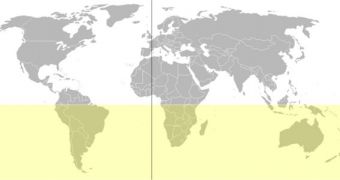A new set of data released by NASA exclusively to ScienceNow shows that last year was the warmest ever recorded in human history for the Southern Hemisphere. Even if it may seem counter-intuitive, given the fact that the Northern Hemisphere is currently experiencing one of its coldest winters in decades, officials at the American space agency say that the temperature variation in the South was considerably over anything else recorded there. According to analysts, the new data add further credence to the theory that states the 2000s were the warmest decade ever.
The reason why these findings are disturbing is the very constitution of the Southern Hemisphere. While the North is covered with landmasses to a great extent, the South is mostly water, other than South America, a chunk of Africa and Australia/Oceania. When looking at the effects of climate change and global warming, researchers reveal that the oceans tend to heat or cool a lot slower, and with less variations than landmasses. Therefore, whatever happens in the South is a clear indicator of the state of the environment, they add. Landmasses may cool very fast, giving us the false impression that global warming is moving further away.
The new datasets show that the average temperatures of 2009 in the Southern Hemisphere were some 0.49 degrees Celsius higher than the long-term mean recorded between 1951 and 1980. While this may not seem like much at first, remember that this value represents a quarter of the maximum two-degree-Celsius increase that should be allowed on our planet. Values higher than that could lead to catastrophic consequences, especially for people living in coastal areas, in major cities next to seas and oceans, and in regions that are highly dependent on natural, reoccurring phenomena, such as monsoons. The Intergovernmental Panel on Climate Change (IPCC) says that the temperature increase needs to be kept below two degrees Celsius until at least 2100.
The margin of error for the new investigation was of +/- 0.05 degrees Celsius. The new information is added to existing studies published a short while back by the US National Oceanic and Atmospheric Administration (NOAA), and by the UN World Meteorological Organization (WMO), which both said that the 2000s were 0.54 degrees Celsius warmer than the average of the 1990s. Coupling all this information led NASA mathematician Reto Ruedy to conclude that 2009 was the warmest year on record in the Southern Hemisphere. The expert is based at the Goddard Institute for Space Studies, in New York City.

 14 DAY TRIAL //
14 DAY TRIAL //